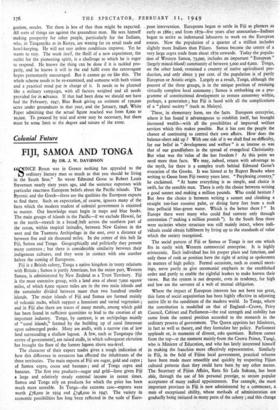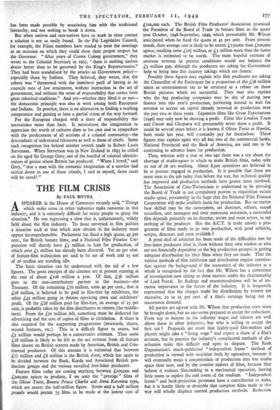Colonial Futnre
FIJI, SAMOA AND TONGA
By DR. J. W. DAVIDSON tiOINCE Byron was in Greece nothing has appealed to the
0 ordinary literary man so much as that you should be living in the South Seas." So wrote Edmund Gosse to Robert Louis Stevenson nearly sixty years ago, and the sentence expresses with particular exactness European beliefs about the Pacific islands. The Byronic and the Greek—these are the qualities the European expects to find there. Such an expectation, of course, ignores many of the facts which the modern student of colonial government is enjoined to master. Our knowledge must begin in maps and blue books. The main groups of islands in the Pacific—if we exclude Hawaii, far to the north—stretch in a broad belt across the southern part of the ocean, within tropical latitudes, between New Guinea in the west and the Tuamotu Archipelago in the east, over a distance of between five and six thousand miles. In the centre of this belt lie Fiji, Samoa and Tonga. Geographically and politically they present many contrasts ; but there is considerable similarity between their indigenous cultures, and they were in contact with one another before the coming of Europeans.
Fiji is a British colony, Tonga a native kingdom in treaty relations with Britain ; Samoa is partly American, but the major part, Western Samoa, is administered by New Zealand as a Trust Territory. Fiji is the most extensive group, with a land area of about 7,000 square miles, of which 6,000 square miles are in the two main islands and the remainder divided between more than two hundred smaller islands. The major islands of Fiji and Samoa are formed mainly of volcanic rocks, which support a luxuriant and varied vegetation ; and in Fiji also there are traces of many metals, among which gold has been found in sufficient quantities to lead to the creation of an important industry. Tonga, by contrast, is an archipelago mainly of "coral islands," formed by the building up of coral limestone upon submerged peaks. Many are atolls, with a narrow rim of low land surrounding a shallow lagoon. A few, such as Tongatapu (the centre of government), are raised atolls, in which subsequent elevation has brought the floor of the former lagoon above sea-level.
The character of their export trades gives a rough indication of how this difference in resources has affected the inhabitants of the three territories. The main exports of Fiji are sugar, gold and copra ; of Samoa copra, cocoa and bananas ; and of Tonga copra and bananas. The first two products—sugar and gold—have given Fiji a large and relatively steady external income in recent times. Samoa and Tonga rely on products for which the price has been much more unstable. In Tonga—the extreme case--exports were worth L78,000 in 1934 and £748,000 in 1947. The variety in economic possibilities has long been reflected in the scale of Euro-
pean intervention. Europeans began to settle in Fiji as planters as early as 186o ; and from 1879—five years after annexation—Indians began to arrive as indentured labourers to work on the European estates. Now the population of a quarter of a million includes slightly more Indians than Fijians. Samoa became the centre of a very large copra trade from about 1870 onwards. Today the popula- tion of Western Samoa, 75,000, includes an important "European" (largely mixed-blood) community of between 5,000 and 6,000. Tonga, on the other hand, remained a country of native agricultural pro- duction, and only about 3 per cent. of the population is of partly European or Asiatic origin. Largely as a result, Tonga, although the poorest of the three groups, is in the unique position of retaining virtually complete local autonomy ; Samoa is embarking on a pro- gramme of constitutional development to restore autonomy within, perhaps, a generation ; but Fiji is faced with all the complications of a "plural society" (such as Malaya).
These, in elementary form, are the facts. European enterprise, where it has found it advantageous to establish itself, has brought increased wealth—with all the possibilities of improved welfare services which this makes possible. But it has cost the people the chance of continuing to control their own affairs. How does the balance-sheet add up ? With one side of it we shall find no difficulty, for our belief in "development and welfare" is as intense as was that of our grandfathers in the spread of evangelical Christianity. But what was the value of the lost freedom ? At this point we need more than facts. We may, indeed, return with advantage to the myth, for there is a complex truth behind Edmund Gosse's evocation of the Greeks. It was hinted at by Rupert Brooke when writing to Glasse from Fiji twenty years later. "Perplexing, country," he exclaimed. "At home everything is so simple, and choice is • swift, for the sensible man. There is only the choice between writing a good sonnet and making a million pounds. Who could hesitate ? But here the choice is between writing a sonnet and climbing a straight too-foot coconut palm, or diving forty feet from a rock into pellucid blue-green water. Which is the better there ? " In Europe there were many who could find content only through ostentation (" making a million pounds "). In the South Seas there were societies whose structure was still mainly intact, where indi- viduals could obtain fulfilment by living up to the standards of value which the society recognised.
The social pattern of Fiji or Samoa or Tonga is not one which fits in easily with Western commercial enterprise. It is highly aristocratic. Each individual has his proper place and function, and only those of rank or position have the right of acting as spokesmen in matters of high policy. Formal occasions, such as council meet- ings, serve partly to give ceremonial emphasis to the established order and partly to enable the rightful leaders to make known their views. But the system is not despotic, even in tendency, for high and low are the servants of a web of mutual obligation.
Where the impact of European interests has not been too great, this form of social organisation has been highly effective in adjusting native life to the conditions of the modern world. In Tonga, where the constitution is modelled on that of England—Crown, Privy Council, Cabinet and Parliament—the real strength and stability has come from the central position accorded to the monarch in the ordinary process of government. The Queen appoints her Ministers, in fact as well as theory, and they formulate her policy. Parliament applauds or, in moments of dissent, asks questions. Reform comes from the top—at the moment mainly •from the Crown Prince, Tungi, who is Minister of Education, and who has lately interested himself in making the franchise more effectively representative. Similarly in Fiji, in the field of Fijian local government, practical reforms have been made more smoothly and quickly by respecting Fijian cultural patterns than they could have been by any other means. The Secretary of Fijian Affairs, Ratu Sir Lala Sukuna, has been able, through the use of his personal prestige, to secure popular acceptance of many radical appointments. For example, the most important province in Fiji is now administered by a commoner, a man of exceptional ability, whose methods of administration are gradually being imitated in many parts of the colony ; and this change has been made possible by associating him with the traditional hierarchy, and not seeking to break it down.
But when natives and non-natives have to work in close contact a solution is not so easily found. In the Fiji Legislative Council, for example, the Fijian members have tended to treat the meetings as an occasion on which they could show their proper respect for the Governor. "After years of Crown Colony government," they wrote to the Colonial Secretary in 1935, "there is nothing natives desire better than to be governed by the King's Representative." They had been scandalised by the attacks on Government policy— especially those by Indians. They believed, they wrote, that the colony was "threatened with the imminent peril of having in its councils men of low attainment, without instruction in the art of government, and without the sense of responsibility that comes from great inherited traditions." And yet—whether they liked it or not— the democratic principle was also at work among both Europeans and Indians. In practice, there is no alternative to finding a working compromise and gaining at least a partial vision of the way forward.
For the European charged with a share of responsibility this necessitates more than facts. It necessitates the imagination to appreciate the worth of cultures alien to his own and to sympathise with the predicament of all sections of a colonial community—the descendants of indentured labourers as well as those of chiefs. Some such recognition lies behind another remark made to Robert Louis Stevenson. When Stevenson was in New Zealand in 1893 he called on the aged Sir George Grey, one of the handful of colonial adminis- trators of genius whom Britain has produced. "When I heard," said Grey, "that a man with the romantic imagination of a novelist had settled down in one of those islands, I said to myself, those races will be saved! "







































 Previous page
Previous page